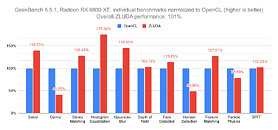- Joined
- Aug 19, 2017
- Messages
- 2,736 (1.01/day)
AMD has quietly funded an effort over the past two years to enable binary compatibility for NVIDIA CUDA applications on their ROCm stack. This allows CUDA software to run on AMD Radeon GPUs without adapting the source code. The project responsible is ZLUDA, which was initially developed to provide CUDA support on Intel graphics. The developer behind ZLUDA, Andrzej Janik, was contracted by AMD in 2022 to adapt his project for use on Radeon GPUs with HIP/ROCm. He spent two years bringing functional CUDA support to AMD's platform, allowing many real-world CUDA workloads to run without modification. AMD decided not to productize this effort for unknown reasons but did open-source it once funding ended per their agreement. Over at Phoronix, there were several benchmarks testing AMD's ZLUDA implementation over a wide variety of benchmarks.
Benchmarks found that proprietary CUDA renderers and software worked on Radeon GPUs out-of-the-box with the drop-in ZLUDA library replacements. CUDA-optimized Blender 4.0 rendering now runs faster on AMD Radeon GPUs than the native ROCm/HIP port, reducing render times by around 10-20%, depending on the scene. The implementation is surprisingly robust, considering it was a single-developer project. However, there are some limitations—OptiX and PTX assembly codes still need to be fully supported. Overall, though, testing showed very promising results. Over the generic OpenCL runtimes in Geekbench, CUDA-optimized binaries produce up to 75% better results. With the ZLUDA libraries handling API translation, unmodified CUDA binaries can now run directly on top of ROCm and Radeon GPUs. Strangely, the ZLUDA port targets AMD ROCm 5.7, not the newest 6.x versions. Only time will tell if AMD continues investing in this approach to simplify porting of CUDA software. However, the open-sourced project now enables anyone to contribute and help improve compatibility. For a complete review, check out Phoronix tests.


View at TechPowerUp Main Site | Source
Benchmarks found that proprietary CUDA renderers and software worked on Radeon GPUs out-of-the-box with the drop-in ZLUDA library replacements. CUDA-optimized Blender 4.0 rendering now runs faster on AMD Radeon GPUs than the native ROCm/HIP port, reducing render times by around 10-20%, depending on the scene. The implementation is surprisingly robust, considering it was a single-developer project. However, there are some limitations—OptiX and PTX assembly codes still need to be fully supported. Overall, though, testing showed very promising results. Over the generic OpenCL runtimes in Geekbench, CUDA-optimized binaries produce up to 75% better results. With the ZLUDA libraries handling API translation, unmodified CUDA binaries can now run directly on top of ROCm and Radeon GPUs. Strangely, the ZLUDA port targets AMD ROCm 5.7, not the newest 6.x versions. Only time will tell if AMD continues investing in this approach to simplify porting of CUDA software. However, the open-sourced project now enables anyone to contribute and help improve compatibility. For a complete review, check out Phoronix tests.


View at TechPowerUp Main Site | Source






